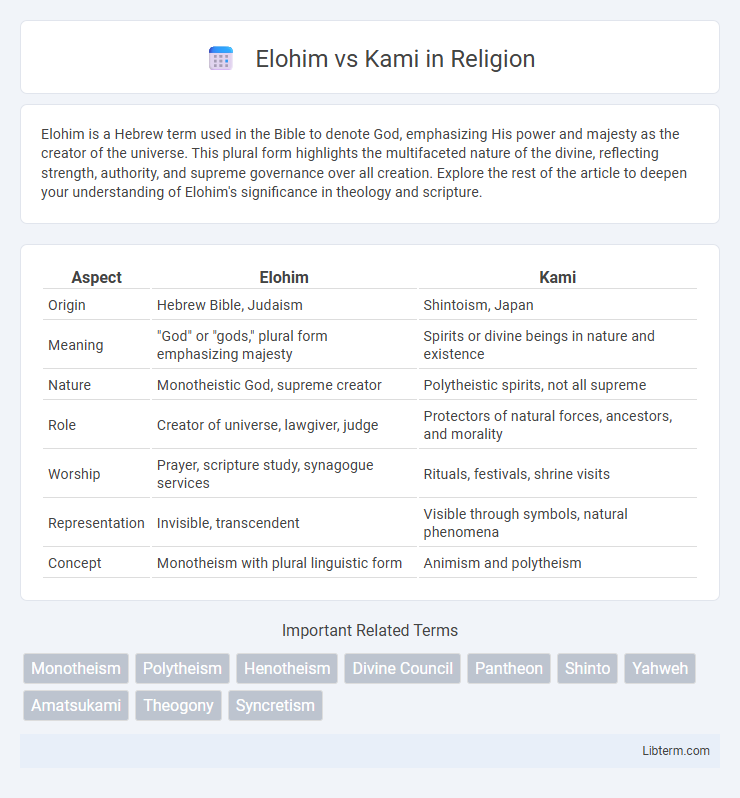Elohim is a Hebrew term used in the Bible to denote God, emphasizing His power and majesty as the creator of the universe. This plural form highlights the multifaceted nature of the divine, reflecting strength, authority, and supreme governance over all creation. Explore the rest of the article to deepen your understanding of Elohim's significance in theology and scripture.
Table of Comparison
| Aspect | Elohim | Kami |
|---|---|---|
| Origin | Hebrew Bible, Judaism | Shintoism, Japan |
| Meaning | "God" or "gods," plural form emphasizing majesty | Spirits or divine beings in nature and existence |
| Nature | Monotheistic God, supreme creator | Polytheistic spirits, not all supreme |
| Role | Creator of universe, lawgiver, judge | Protectors of natural forces, ancestors, and morality |
| Worship | Prayer, scripture study, synagogue services | Rituals, festivals, shrine visits |
| Representation | Invisible, transcendent | Visible through symbols, natural phenomena |
| Concept | Monotheism with plural linguistic form | Animism and polytheism |
Introduction to Elohim and Kami: Defining the Concepts
Elohim is a Hebrew term used in the Bible to describe the singular, all-powerful God in a plural form, emphasizing divine majesty and authority. Kami in Shintoism refers to spirits or deities representing natural forces, objects, and ancestors, embodying both benevolence and supernatural influence. Both concepts reflect distinct theological frameworks: Elohim embodies monotheistic divinity, while Kami represents animistic spirituality within Japanese culture.
Historical Origins: Elohim in Abrahamic Texts, Kami in Shinto
Elohim, a plural term used for God in Abrahamic texts, originates from ancient Hebrew scriptures, embodying a complex singular divine entity with creative and judicial powers. Kami, central to Shinto, represents spirits or phenomena with sacred qualities, deeply rooted in Japan's indigenous beliefs and nature worship traditions. These distinct origins highlight Elohim's role in monotheistic theology versus Kami's embodiment of animism and ancestral reverence in Shinto practice.
Theological Attributes: Characteristics of Elohim vs Kami
Elohim in Hebrew theology embodies divine omnipotence, justice, and covenantal relationship, signifying a singular, supreme creator with commandments guiding moral conduct. Kami in Shinto belief represents multifaceted spiritual beings linked to nature, ancestors, and phenomena, emphasizing harmony, purity, and ritual practice without a centralized moral law. Elohim's transcendence contrasts with Kami's immanence, reflecting foundational differences in divine authority and interaction within their respective religious frameworks.
Cosmology and Creation: How Elohim and Kami Shape the Universe
Elohim, a plural term for God in the Hebrew Bible, represents a powerful divine force responsible for the creation and ongoing governance of the universe, shaping cosmology through intentional design and order. Kami, in Shinto belief, are spirits or deities embodying natural elements and phenomena, influencing the cosmos by manifesting in and harmonizing with the environment rather than imposing a singular creation event. While Elohim emphasizes a monotheistic, purposeful creation shaping space and time, Kami reflect a polytheistic worldview where multiple forces collectively sustain and animate the universe's ongoing life cycle.
Role in Worship: Rituals for Elohim and Kami
Elohim in Judaism and Christianity is worshipped through structured rituals including prayer, sacrifices, and liturgical ceremonies emphasizing monotheistic devotion and covenantal relationship. Kami in Shinto practices are honored via offerings, purification rites, and festivals (matsuri), reflecting animistic and nature-focused spirituality with a strong communal aspect. Ritual worship of Elohim centers on scripture and moral laws, while Kami rituals highlight harmony with nature and ancestral spirits.
Moral and Ethical Guidance: Comparative Perspectives
Elohim in Judeo-Christian tradition embodies absolute moral authority, providing explicit commandments and ethical laws that shape communal and individual behavior, emphasizing justice, righteousness, and covenant faithfulness. Kami in Shinto belief represent natural and ancestral spirits, offering moral guidance through harmonious living, purity, and respect for nature, without codified laws, relying on ritual practices and community consensus. Comparative perspectives highlight Elohim's prescriptive ethics versus Kami's experiential and situational morality, reflecting differing cultural approaches to divine authority and ethical conduct.
Human-Divine Relationship: Interaction with Elohim vs Kami
Elohim in the Hebrew Bible embodies a covenantal relationship with humans, emphasizing obedience, worship, and moral accountability through divine commandments and covenants. Kami in Shinto represents a more immanent and harmonious interaction, where humans engage with nature spirits through rituals, offerings, and festivals to maintain balance and favor. The Elohim-human relationship is rooted in divine authority and law, while the Kami-human interaction centers on coexistence and spiritual reciprocity within the natural world.
Cultural Significance: Impact on Society and Tradition
Elohim, a plural form used in the Hebrew Bible, represents the monotheistic conception of God, significantly shaping Judeo-Christian religious practices, moral codes, and societal laws throughout history. Kami, central to Shintoism, embodies natural spirits and ancestral deities, influencing Japanese cultural values, rituals, festivals, and the harmonious relationship between humans and nature. Both concepts deeply impact their respective societies by reinforcing cultural identity, traditional ceremonies, and community cohesion through spiritual beliefs.
Evolution of Belief: Changing Views of Elohim and Kami Over Time
The evolution of belief in Elohim and Kami reflects significant cultural and religious transformations across history. Elohim, rooted in ancient Hebrew texts, initially represented a plural concept of divine beings but gradually shifted towards a singular, omnipotent God within monotheistic Judaism and Christianity. Kami, originating in Shinto tradition, evolved from animistic spirits tied to nature and ancestors into complex deities integrated with Buddhist influences, illustrating the syncretism of Japanese spiritual practices.
Comparative Analysis: Key Similarities and Differences
Elohim in the Hebrew Bible and Kami in Shinto both represent divine beings, but Elohim is a singular, supreme creator deity often depicted with omnipotence, while Kami encompasses a diverse range of spirits or gods linked to natural elements and ancestors in Japanese spirituality. Elohim embodies monotheistic attributes emphasizing creation and law, whereas Kami reflects polytheistic traits with localized worship and animistic practices. The theological scope of Elohim stresses covenantal relationships with humanity, contrasting with Kami's role in maintaining harmony between humans, nature, and the spiritual world.
Elohim Infographic

 libterm.com
libterm.com